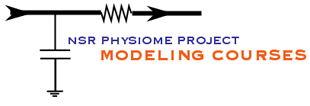Schedule TBD.
2012 Summer Course:
- Interested in learning more about the NSR course not listed here? Contact: Gary Raymond
- Course Materials
- Course materials and specific information for Summer Session
- NSR Course archives (with previous course syllabi)
Location and Facilities: The course will be held in the Advanced Computing Lab in the W.H. Foege Building at the University of Washington, Seattle, Washington. Participants will have internet access for their own laptops provided by the University of Washington.
Goals: Under the direction of an experienced faculty, course participants will learn basic physiological systems-level modeling, using the cardiovascular and respiratory systems as their guide. The underlying focus of the course is on approaches to data analysis. This will be accomplished through the application of mathematical models to assist in hypothesis formulation and to experimental design and evaluation. Upon completion of the course, participants will be able to:
|
|
Topics covered:
1. Computational approaches:
|
2. Transport and Metabolism in Physiological Systems:
|
3. Target Applications:
|
Target audience: Academics and others interested in quantitative analysis of biological systems. Open to all clinical and research scientists. No specific programming experience is required.
Participants can expect to be able to integrate modeling analysis into their scientific research and clinical applications development. We encourage participants to bring their own experimental data sets to analyze under the guidance of course instructors.
Course enrollment is limited to twenty-five people, and we encourage early registration.
Course prep/background information:
- Participants will make extensive use of computer models from NSR Physiome Models.
- Participants will use primarily NSR Physiome JSim (JSim), a simulation system for building and analyzing quantitative models. Get JSim here.
- Everyone is encouraged to either download JSim to their local system (Linux, Mac, PC) and explore models listed here or JSim can also be run through Java enabled browsers without downloading to local desktop.
Fees: The fee for the course is $400. Participants are responsible for the cost of transportation, accommodation, and meals.
Upon registration acknowledgement, please mail a $400 check or money order, made out to The University of Washington, to:
Mr. Gary Raymond
Department of Bioengineering
Box 355061
University of Washington
Seattle WA 98195-5061
Scholarships: Scholarship money is available for course fee waivers and travel stipends preferably for new investigators. Applicants interested the scholarships must, in addition to filling out the registration form, send a one- page letter that demonstrates need and a defined interest in the field of modeling, along with two letters of recommendation to Mr. Gary Raymond. We regret that course scholarships, including fee waivers and travel stipends, can only be awarded to landed immigrants and US citizens.
Application deadline for scholarship aid: TBD
Please address all scholarship queries to: Mr. Raymond.
Other Cardiovascular system modeling classes:
-
National Heart Lung and Blood Institute Computational Modeling
Model development and archiving support at https://www.imagwiki.nibib.nih.gov/physiome/ provided by the following grants: NIH U01HL122199 Analyzing the Cardiac Power Grid, 09/15/2015 - 05/31/2020, NIH/NIBIB BE08407 Software Integration, JSim and SBW 6/1/09-5/31/13; NIH/NHLBI T15 HL88516-01 Modeling for Heart, Lung and Blood: From Cell to Organ, 4/1/07-3/31/11; NSF BES-0506477 Adaptive Multi-Scale Model Simulation, 8/15/05-7/31/08; NIH/NHLBI R01 HL073598 Core 3: 3D Imaging and Computer Modeling of the Respiratory Tract, 9/1/04-8/31/09; as well as prior support from NIH/NCRR P41 RR01243 Simulation Resource in Circulatory Mass Transport and Exchange, 12/1/1980-11/30/01 and NIH/NIBIB R01 EB001973 JSim: A Simulation Analysis Platform, 3/1/02-2/28/07.


